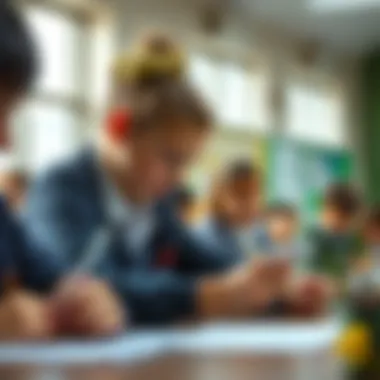Exploring Top British Schools in Dubai


Intro
As the sun sets over the sparkling skyline of Dubai, a quiet sense of ambition permeates the air. Among the many factors contributing to this intoxicating mix of culture and innovation, education stands out as a cornerstone. With a rapidly expanding expat community, the demand for quality education has surged, especially for British schools. Parents are increasingly seeking institutions that adhere to British educational standards, adapted skillfully to Dubai's cosmopolitan context.
Amidst this flourishing landscape, British schools in Dubai have carved a niche, offering unique educational philosophies, vibrant extracurricular activities, and connections to the global job market that birth prospects for their students.
In this article, we journey through the features that make these schools exceptional, navigating key institutions and their respective curricula. The distinct attributes of these schools aren't just appealing to expatriate families; they also reflect the evolution of educational frameworks that meet the diverse needs of their student bodies.
Moreover, the rapid succession of Dubai's development has placed education at the forefront, ensuring that students are not just ready for local markets but are well-prepared for the global stage. Through in-depth insights, we will also touch upon logistics, assessments, and the opportunities which lay beyond the classroom walls.
This exploration seeks to illuminate the British educational landscape in Dubai, a fusion of tradition and modernity where every brick in the school wall represents a step towards crafting informed, ambitious, and adaptable future leaders.
Intro
In the bustling, cosmopolitan city of Dubai, British schools stand out as key players in shaping the educational landscape. With a rich heritage and a unique blend of tradition and modernity, these institutions have become a preferred choice for many expatriates and local families alike. The significance of understanding the merits of British education in Dubai cannot be overstated, as this knowledge is paramount for investors, homebuyers, realtors, and even educational planners.
The environment in which these schools operate is as diverse as the student body they cater to. The British curriculum, revered worldwide for its rigor and relevance, equips students not just with knowledge, but with a well-rounded education. Students here are taught critical thinking, creativity, and adaptability—skills that are invaluable in today’s dynamic world. Parents considering British education for their children often cite its global recognition as a compelling reason, aiding entry into esteemed universities across the globe.
Factors like the strong emphasis on extracurricular activities create well-rounded individuals prepared for the challenges ahead. The schools encourage a balance between academics and personal development, pushing students to explore their passions outside the classroom.
Moreover, with the influx of expatriates, the demand for British schools has surged, leading to a vibrant competitive landscape. As these schools adapt to local needs while maintaining their core values, it’s essential to explore the unique characteristics that each of them offers.
In this article, we will not just scratch the surface but plunge into the fabric of British schools in Dubai. We will look at their historical context, highlight current trends, and profile prominent institutions.
By gaining insightful perspectives on the curriculum and the broader educational philosophy, we aim to equip readers with a comprehensive guide. In understanding these factors, one truly appreciates how British schools are shaping the future of education in Dubai.
"Education is the passport to the future, for tomorrow belongs to those who prepare for it today."
As we navigate through this discourse, the interplay between cultural influences, community involvement, and the ongoing evolution of educational strategies will reveal much about the advantages and challenges these schools face. Thus, it becomes crucial for families and stakeholders to grasp what lies ahead in the sphere of British education in this vibrant city.
Overview of British Education in Dubai
British education in Dubai has carved out a distinct niche and holds significant sway in the region’s academic landscape. It mirrors the UK educational framework closely while also integrating local cultural aspects. This confluence not only aligns with the expectations of expatriate families but also contributes to the broader goal of raising educational standards in the UAE.
When one looks at the various British schools across Dubai, it becomes clear that these institutions focus not just on academic excellence but also on developing well-rounded individuals. The British curriculum, recognized globally for its rigor, ensures that students are equipped with the skills needed to compete on an international stage. Parents often consider factors like curriculum depth, teacher qualifications, and extracurricular offerings when choosing a school. This creates a competitive environment where schools continuously strive to enhance their offerings.
Historical Context
The roots of British education in Dubai stretch back several decades. In the early days, schools were primarily set up to cater to the needs of the expatriate community. This historical backdrop reveals a landscape that has evolved alongside Dubai itself. Initially, education was quite limited and often informal. However, as the city transformed into a bustling metropolis, the demand for quality education surged.
The introduction of the first British school in the 1990s marked a turning point. It was more than just an educational institution; it was a beacon for British families seeking a familiar academic environment. Over time, as the population of expatriates increased, so did the number of British schools, culminating in a robust network that offers diverse educational choices today. The emphasis on quality has fostered a reputation that attracts not only British expatriates but also locals who value an internationally recognized education.
Current Trends
At present, British schools in Dubai are experiencing pivotal shifts reflective of global educational trends. One significant characteristic is the rise of technology in classrooms. Digital tools have become staples in teaching methodologies, enhancing both learning and engagement among students. This shift aligns with the demands of a world that increasingly leans on tech.
Additionally, there has been a growing trend of schools offering blended learning options, combining traditional face-to-face education with online resources. This approach allows flexibility and caters to different learning styles. Furthermore, the educational philosophy is evolving to emphasize skills like critical thinking and creativity, making education more relevant in today’s context.
The influence of global citizenship is another noteworthy trend. Many British schools are instilling values that go beyond academics, focusing on cultural appreciation and social responsibility. As a result, students are not just learning facts; they are being prepared to navigate complex global challenges.
In summary, the overview of British education in Dubai sheds light on a dynamic environment that is continually adapting to meet the needs of its diverse student body. The historical context shows a growth trajectory filled with remarkable developments, while current trends indicate a forward-thinking approach to education that balances traditional methods with modern innovations.
Prominent British Schools in Dubai
The British education system in Dubai continues to gain traction due to its robust structure and proven efficacy. This section shines a spotlight on prominent British schools in Dubai, exploring their significance and the unique attributes that set them apart. The schools discussed in this article provide much more than just academic prowess; they offer robust extracurricular programs, cultural diversity, and an educational philosophy that places as much emphasis on character development as it does on academic results. Understanding these schools can aid homebuyers, investors, and expats in navigating educational choices while considering residence in Dubai.
School Profiles
School A Overview


One of the standout institutions is Dubai British School, known for its progressive curriculum that aligns closely with the UK national standards. This school has a commendable track record in preparing students for both the International Baccalaureate and A-Levels. The inclusive environment fosters academic curiosity and social development, making it a popular choice among expatriate families.
The unique feature of its extensive extracurricular offerings, ranging from sports to arts, gives students opportunities to explore varied interests outside of academics. However, the competitive climate can be quite intense, which may pose a challenge for some students who may find the pressure overwhelming. With a commitment to nurturing well-rounded individuals, Dubai British School exemplifies the advantages of British education in the region.
School B Overview
Jumeirah College comes to mind as another exceptional establishment with a solid reputation. One of its key characteristics is the emphasis on holistic education combined with high academic standards. The school boasts state-of-the-art facilities and a robust selection of A-Level courses, preparing pupils for university life both in the UK and globally.
A noteworthy aspect is its focus on student leadership and community service, instilling values of responsibility and compassion from an early age. The downside? The school can be quite selective during the admissions process, leading to a lottery-like feel for many hopeful parents. Nevertheless, Jumeirah College consistently ranks high in educational outcomes, making it a reliable choice for families seeking quality education in a supportive environment.
School Overview
Finally, Kings' School Dubai deserves mention for its remarkable combination of traditional British values and a modern approach to education. Known for its rigorous academic offerings alongside a broad range of extracurricular activities, it prepares students to become not just scholars but also global citizens. A hallmark of this institution is its dedication to personalizing learning experiences, which enables students to thrive academically at their own pace.
However, some families may find the tuition fees on the higher side, which might limit accessibility to a broader demographic. Despite this, the uniqueness of its academic rigor and supportive learning environment makes it a highly desirable choice for many expatriate families seeking an outstanding educational experience for their children.
"Choosing the right school is often as critical as selecting the right home in Dubai. The education your child receives shapes their future, both academically and socially."
The profiles detailed above illustrate how prominent British schools in Dubai not only provide high standards of education but also adapt to the rich tapestry of cultures present in the region. Each school offers a blend of academic challenges and support systems that align closely with British educational philosophies, making them a cornerstone for families looking to invest in quality education.
Curriculum and Educational Philosophy
The curriculum and educational philosophy are central to understanding what sets apart British schools in Dubai. This intricate framework influences the way knowledge is imparted and the overall learning experience that students receive. The British system emphasizes a structured yet flexible approach to education, allowing schools to tailor their teaching to the diverse needs of students while adhering to rigorous academic standards.
The British curriculum is widely recognized for its comprehensive nature, which aims to create well-rounded individuals. By instilling critical thinking and problem-solving skills, it prepares students to navigate today's fast-paced world. The importance of this educational philosophy cannot be overstated, as it cultivates a culture of inquiry and encourages students to take ownership of their learning.
British Curriculum Structure
At the core of the British education system is a clearly defined structure that encompasses various stages. The curriculum is generally divided into key stages, starting from Early Years Foundation Stage (EYFS) for the youngest learners and progressing through Key Stage 1 to Key Stage 4. Finally, students have the option to pursue post-16 education with A-Level or vocational qualifications.
Key features include:
- Early Years Foundation Stage (EYFS): Focus on holistic development, integrating play and learning.
- Key Stage 1 and 2: Emphasis on fundamental subjects such as English, Mathematics, Science, and the Humanities.
- Key Stage 3: Introduction to a broader range of subjects to facilitate exploration of interests.
- Key Stage 4: Preparation for General Certificate of Secondary Education (GCSE) exams, which plays a crucial role in university admission.
Schools often augment the curriculum with their unique educational philosophies, such as the International Baccalaureate framework or an emphasis on character development through values-based education. This combination of structure and adaptability fosters an environment ripe for academic excellence and personal growth, which is vital for parents seeking the best for their children.
IB vs. A-Level Options
When it comes to post-16 education, students at British schools in Dubai often face a crucial decision: whether to pursue the International Baccalaureate (IB) or the more traditional A-Level qualifications. Each pathway provides distinct advantages and caters to different student needs.
- A-Levels:
- International Baccalaureate (IB):
- Specialization in three to four subjects, allowing in-depth study.
- Recognized globally, particularly in the UK, which benefits students aiming for universities there.
- Generally requires exams at the end of the two-year course, which can put pressure on students.
- Offers a well-rounded curriculum with mandatory subjects in languages, mathematics, sciences, the arts, and more.
- Focuses on developing critical thinking and research skills through the Extended Essay.
- Highly regarded by international universities, especially in Europe and North America.
Influence of Culture and Community
The influence of culture and community plays a pivotal role in shaping the educational experience within British schools in Dubai. With a mix of both expats and locals, the cultural fabric here is rich and diverse, contributing significantly to learning environments that are not only academic but deeply social and interactive. This section examines how this unique cultural context enhances the educational framework and what it means for families considering British education.
Multicultural Environment
In British schools across Dubai, you’ll find classrooms bustling with students from varied backgrounds. The multicultural environment fosters an atmosphere where respect for different customs and traditions is paramount. This is more than just superficial diversity; it is woven into the very fabric of schooling. Students learn to appreciate different perspectives, which prepares them for future global workplaces.
A curriculum infused with this multicultural essence can enhance critical thinking and collaboration among peers. For instance, students might work together on projects that encourage them to explore each other’s cultural heritage—be it through food fairs that showcase culinary delights or through celebrations of various holidays. Schools actively promote tolerance and understanding.
A few features that characterize this multicultural fabric in British schools include:
- Inclusive Events: Schools often celebrate diverse festivals—from Eid to Diwali—encouraging students to step into each other's shoes, fostering empathy.
- Language Programs: Many institutions offer language courses that reflect the communities represented in the student body, further broadening horizons.
- Community Engagement: Schools frequently engage with local communities to gather insight and feedback, ensuring that they cater to the needs of all families.


Parental Involvement
When it comes to education in Dubai, parental involvement cannot be overstated. Parents are often seen not just as guardians, but as crucial partners in the educational journey. In British schools, this collaboration manifests in various ways, influencing not only student success but also enhancing community ties.
Parent-teacher associations (PTAs) are robust here, serving as platforms for dialog and cooperation. Events are regularly organized to keep parents informed about curriculum changes, school policies, and community outreach initiatives. Involvement in such activities not only helps in building stronger relationships among parents but also instills a sense of belonging.
Furthermore, many schools encourage parents to share their professional experiences or cultural background with students. This approach not only enriches the educational experience but also helps students forge connections between their academic pursuits and real-world applications.
Benefits of parental involvement include:
- Better Academic Performance: Research consistently shows that engaged parents can support their children’s achievements.
- Increased Satisfaction: Families that feel involved generally report a higher satisfaction with the school system.
- Community Building: Collaborative events help nurture bonds among families, contributing to a strong community spirit that echoes throughout the school.
In summary, the interplay between culture and community situation is immense in the educational landscape of British schools in Dubai. This dynamic environment nurtures respect, enhances learning, and builds connections—making every child’s journey through education a shared experience that extends far beyond the classroom.
Benefits of British Education
When it comes to the realm of education, the value of a British curriculum shines brightly, especially in a vibrant city like Dubai. As families navigate their options within this bustling metropolis, the appeal of British education stems from a blend of academic rigor, global recognition, and a rich tapestry of extracurricular activities. Understanding these benefits can help parents and students make informed choices about their educational journey.
Academic Rigor
British schools are renowned for their challenging and structured approach to education. The emphasis is placed on critical thinking, analytical skills, and a deep understanding of subject matter. Students engage in a curriculum that encourages them to explore topics in depth rather than skimming the surface.
- A-Level Focus: At the upper secondary level, A-Levels offer specialization in subjects of choice. This means students can hone in on what intrigues them, while also prepping for university pathways that align with their career aspirations.
- Assessment Criteria: Regular assessments ensure that learners are on track, and a robust evaluation framework means that student performance is continually monitored. This can be a breath of fresh air for parents who want to know how their child is progressing.
- University Preparation: British education firmly prepares students for higher education globally. With the robust curriculum aligning well with top universities' expectations, students emerge as well-prepared candidates for admission processes.
Global Recognition
One of the standout aspects of British education is its wide recognition worldwide. A qualification from a British school is often viewed favorably by employers and educational institutions across the globe. This global perspective is particularly valuable in a diverse environment like Dubai, which hosts an array of nationalities.
- Impact on Employability: Students from British schools tend to enjoy competitive advantages in the job market. Employers frequently look to hire candidates who have undertaken rigorous academic training, which is a hallmark of the British education system.
- Transnational Connections: The British curriculum is not just confined to the UK. It carries weight in countries from Australia to Canada, opening doors for students to pursue higher education or careers in various nations.
- Standardization: UK qualifications are standardized, meaning wherever you go, the quality and rigor of the education are recognized. This consistency helps students benefit from a uniform education experience, irrespective of where they are based.
Extracurricular Activities
A well-rounded education incorporates not just academics but also the holistic development of a child. British schools in Dubai offer a wealth of extracurricular opportunities that can enrich a student's school life.
- Variety of Options: From sports like football and swimming to arts programs such as drama and painting, students have a plethora of options to choose from. This diversity allows students to explore new interests and find their passions.
- Soft Skills Development: Participation in these programs helps enhance soft skills like teamwork, leadership, and time management. These facets are essential in our interconnected world, and employers look for these traits in potential hires.
- Community Engagement: Many British schools encourage students to engage with local communities through volunteer work and initiatives. This not only strengthens character but also cultivates a sense of social responsibility.
"Education is not preparation for life; education is life itself." – John Dewey
As seen, the benefits of British education in Dubai are multifaceted. It fosters academic prowess, opens paths for global recognition, and facilitates a comprehensive learning experience through diverse extracurricular offerings. Every family considering educational options will find that aligning with this curriculum not only positions their children for academic success but also paves a road for future opportunities.
Challenges Faced by British Schools in Dubai
Understanding the challenges faced by British schools in Dubai is crucial for anyone considering their options in this rapidly changing educational landscape. From the admissions process to navigating competition among schools, these hurdles can significantly impact a student’s educational journey and a parent's decision.
Admissions Process
The admissions process can often feel like a labyrinth—a challenge for both parents and prospective students. With demand high for spaces in reputable British schools, the application process frequently involves several steps that can be leaves parents feeling overwhelmed. Applicants must often provide detailed documentation, including previous school reports, recommendation letters, and sometimes even undergo assessments or interviews.
Schools like Dubai British School or Brighton College implement both academic and behavioral evaluations to gauge the fit of a student. This comprehensive approach is designed to ensure that the child's capabilities align with the school’s ethos and teaching style. However, it can put pressure on families, knowing that places are limited and competition is intense.
In addition, many schools have specific entry points—such as Year 7 or Year 12—which means that students must apply well in advance. Further complicating matters, national holidays and the busy seasons can affect when families can visit schools or attend open days. It’s not uncommon for parents to find themselves scrambling just to meet deadlines, highlighting the stress of timing within the admissions process.
"Navigating the admissions process in Dubai’s British schools can sometimes feel like preparing for a marathon, where timing, documentation, and interviews all converge."
Competition Among Schools
The landscape of British education in Dubai is not just crowded; it brims with competition. With a myriad of schools vying for enrollment, each institution attempts to outshine the other, which can be both beneficial and daunting. Schools constantly innovate their curricula, upgrade facilities, and enhance extracurricular offerings, all in a bid to attract families.
On one hand, competition drives academic excellence. Schools often raise their game to include state-of-the-art technology, sports facilities, and a variety of clubs aimed at nurturing talents. Each school’s commitment to delivering quality education is evident; schools like Jumeirah College or The British International School often boast impressive programs tailored to BBC broadcasting standards or STEM-focused initiatives.


Yet, this competitive spirit can lead to oversaturation in the market, resulting in intense pressure to keep up. Parents are faced not only with choosing the right fit for their child but must also weigh potential waiting lists and a school’s reputation in the community. Decisions often hinge on word-of-mouth recommendations and online reviews, further complicating the choice as businesses and families are intertwined in a vast expanse of choices. In many ways, it’s akin to picking the right stock in a volatile market—one wrong move, and you’re left with regrets.
Educational Regulatory Bodies
Understanding the role of educational regulatory bodies is crucial to navigating the landscape of British education in Dubai. These organizations ensure that schools not only adhere to standards that promote high-quality education but also operate within a framework that supports the diverse needs of the student population. The findings and guidelines set forth by these bodies affect everything from curriculum implementation to teacher qualifications, shaping the educational environment in profound ways.
Knowledge and Human Development Authority
The Knowledge and Human Development Authority (KHDA) plays a pivotal role in the Dubai education sector. Established by the government of Dubai, KHDA is tasked with ensuring high standards in school education. One of its primary functions is to conduct inspections, providing detailed reports that evaluate the performance of schools. This system of inspection serves not only as a method of accountability but also as a guide for parents when choosing a school.
In addition, KHDA facilitates the continuous improvement of the education system through various initiatives and resources. They engage in a dialogue with schools, parents, and the wider community to address concerns and push forward enhancements in educational practices. For instance, their annual school rankings give parents a snapshot of where schools stand, making it easier for families to make informed decisions.
There are multiple advantages to having a regulatory body like KHDA in place:
- Standardization: Ensures that British schools align with both local and international educational standards.
- Quality Assurance: Regular inspections motivate schools to consistently improve their services.
- Parental Empowerment: Provides parents with access to information that influences their choices for their children's education.
British Schools Overseas Accreditation
British Schools Overseas (BSO) accreditation is another layer of educational oversight, catering specifically to schools offering the British curriculum outside of the UK. This accreditation is crucial for schools in Dubai that wish to maintain a strong reputation among expatriates and local families alike.
BSO accreditation involves rigorous evaluation against stringent standards, which focus on the effectiveness of teaching, the quality of leadership, and student outcomes. Schools that achieve this status often attract a higher enrollment, as the accreditation signals solid educational integrity and a commitment to world-class standards.
Key points regarding BSO accreditation include:
- Global Recognition: Families worldwide recognize BSO-accredited schools as providing a British education of high quality.
- Enhanced Opportunities: For schools, accredited status can open doors to more partnerships with UK institutions, enhancing educational opportunities for their students.
- Focus on Continuous Improvement: Regular assessments for BSO help schools stay on the cutting edge of educational methodologies and practices.
Ultimately, both the KHDA and BSO accreditation serve as vital indicators of quality assurance in British education within the thriving, multicultural landscape of Dubai. By ensuring that standards are upheld, these regulatory bodies help create an environment where educational excellence can thrive, benefiting students, parents, and the wider community.
Educational regulatory bodies like KHDA and BSO accreditation positively influence the quality of educational offerings, facilitating informed choices for parents and fostering an atmosphere of growth and improvement for schools in Dubai.
Future of British Education in Dubai
The future of British education in Dubai is a topic of significance, especially as the emirate strives to position itself as a global hub for education. This forward-looking approach is essential for stakeholders such as investors, homebuyers, realtors, and expats who are keenly interested in understanding the educational landscape. The evolution of British schools in Dubai hinges on various dynamics including evolving pedagogical methodologies, increased parental expectations, and the rapid integration of technology in the classroom.
Emerging Trends
Emerging trends within British education in Dubai highlight significant shifts that reflect broader global educational movements. First and foremost, there is a palpable move towards personalized learning, where teaching methods are tailored to fit each student's unique needs and abilities. Furthermore, the rise of interdisciplinary courses aligns with the demands of the global job market, preparing students to think critically and innovate across different fields.
- Sustainability Education: As the world increasingly focuses on environmental issues, many British schools are incorporating sustainability into their curricula. This can range from eco-friendly practices on campus to subjects that delve into climate change and global citizenship.
- Mental Health Awareness: There’s a growing recognition of the importance of mental health among students. Schools are beginning to incorporate programs that focus on emotional well-being, resilience, and mindfulness, preparing students to navigate an often stressful academic environment.
- Blended Learning: The blend of traditional schooling with online resources has gained traction. Students can now learn at their own pace with digital tools, making education more accessible. This hybrid method not only encourages independence but also prepares students for future workplaces where remote work is becoming the norm.
Technological Integration
In an age dominated by technology, the integration of digital tools within the educational framework is undeniably crucial. British schools in Dubai are at the forefront of adopting innovative technologies to enhance the learning experience.
- Smart Classrooms: Many institutions have invested in smartboards and interactive displays, making lessons more engaging. Educators are able to display multimedia content and facilitate discussions that are both informative and captivating.
- Virtual Reality (VR) and Augmented Reality (AR): These technologies enable students to explore complex subjects in an immersive environment. For instance, students studying history can take virtual field trips to ancient civilizations, gaining a deeper understanding than textbooks could offer.
- Learning Management Systems (LMS): Platforms such as Google Classroom or Moodle are now utilized to streamline communication between teachers and students. Assignments, assessments, and grades can be monitored in real time, fostering a transparent and efficient educational environment.
"The incorporation of technology in education is not just about trends; it’s about enhancing the quality of learning and preparing students for unpredictable futures."
As the educational landscape continues to evolve, investors and homebuyers must keep a keen eye on how these trends manifest within individual schools, determining which institutions will best cater to the needs of the next generation. The focus remains on cultivating environments that are not only conducive to learning but are also aligned with technological advancements and the needs of a diverse student body.
Culmination
The significance of British schools in Dubai cannot be understated. These institutions are not just centers for learning; they represent a convergence of educational excellence and multicultural enrichment. When discussing the future of education and the various paths it can take, particularly in a city as dynamic as Dubai, it's essential to understand how British standards of education are shaping the local landscape.
British schools contribute meaningfully to the development of students. They offer a solid academic foundation, preparing students for globally recognized qualifications such as A-levels and the International Baccalaureate. This global perspective gives students an edge in international job markets, making their education here highly valuable.
Moreover, a British education fosters critical thinking and creativity among students, skills that are increasingly important in the ever-evolving world. Parents often seek out British schools for their structured yet adaptable curricula, which allows for personal growth alongside academic achievement.
Furthermore, the diverse and multicultural environment nurtures social skills and cultural appreciation, creating a rich tapestry of experiences for students. This aspect, combined with the schools' commitment to extracurricular activities, helps in creating well-rounded individuals.
Considering all these factors, it's clear that the investment in British education in Dubai is an investment in the future. Families looking to settle in Dubai, be it expats or locals, will find that these schools offer not just a pathway to academic success but also a sense of belonging and community.
"Education is the passport to the future, for tomorrow belongs to those who prepare for it today."
Thus, as the landscape of British education continues to evolve in Dubai, so too will the opportunities and futures of those who become part of it.















